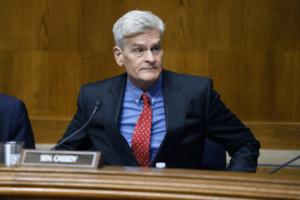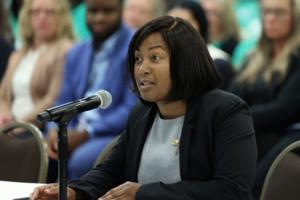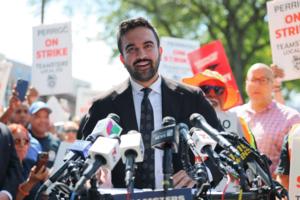Politics
/ArcaMax

Michael Hiltzik: Sen. Cassidy, whose vote got RFK Jr. his job, finally starts to make amends
There were a couple of especially dramatic moments in Wednesday's Senate Health Committee hearing delving into Robert F. Kennedy Jr.'s firing of the director of the Centers for Disease Control and Prevention and the subsequent resignations of three top CDC officials.
Interestingly, both were generated by the committee chair, Sen. Bill Cassidy, ...Read more

David M. Drucker: Trump is not as unpopular as his opponents think
President Donald Trump is not as popular as he claims. But neither is he as unpopular as his opponents might like to think.
That’s the simple explanation. Dig under the hood, however, and things get complicated.
I’m constantly asked to assess Trump’s political standing; it’s among the more consistent questions posed to professional ...Read more

Michael Hiltzik: The Trump administration's attack on Social Security is looking worse
There's some good news related to the Trump administration's concerted attack on the Social Security Administration: Thus far, it doesn't appear to have significantly affected the delivery of benefits. Checks are still going out and payments into beneficiaries' bank accounts are still arriving on time.
Beyond that, however, the system is going ...Read more

Editorial: At a national moment that calls for compassion and calm, Trump uses Charlie Kirk's death to stoke the fires of division
The assassination of Charlie Kirk has become a flashpoint in the deep divide between red and blue America.
The normal and obvious reaction of responsible leaders would be to call for calm and try to unite the country. At least that is what has happened in the past and enabled the Great Experiment to soldier on.
When the country was torn apart ...Read more

COUNTERPOINT: Lionization of Kirk is all wrong
To hear his supporters now, following his murder last week at a Utah university, Charlie Kirk was a brave broker of competing ideas, an honest peddler of open debate who encouraged young people to examine all sides of any claim.
In truth, Kirk was a clever racist. How else to explain his view that the landmark Civil Rights Act was “a huge ...Read more

POINT: Free speech is expensive; Charlie Kirk paid with his life
In the annals of history, free speech has always been a double-edged sword. It’s the lifeblood of our Constitution, the core mechanism by which ideas clash, truths emerge and society thrives. What happens when that sword turns lethal? When the cost of speaking out isn’t lost revenue or livelihood, but a bullet to the neck? That’s the grim ...Read more

Commentary: What would Charlie Kirk do?
As a young Christian conservative growing up in a state that shamed a voice like mine, Charlie Kirk gave me the confidence I thought was impossible to find.
As I sat through high school lectures about gender ideology in a class that was supposed to teach me English literature, my teacher claimed I was a bigot for believing there are only two ...Read more

Anita Chabria: Charlie Kirk gave young men something to believe in. Newsom wants to do the same
Like many young men these days, Kamaldeep Dhanoa, a lanky 17-year-old, knew he wanted to do something with his life, be a part of something, but didn't quite know what that meant.
Coming up with a career was important. But even more, it was finding the right friends — discovering what he wanted to be a part of.
He did both when he joined ...Read more

Editorial: Recent shootings connected by the internet's darkest corners
A 16-year-old gunman shot two students at his Denver-area high school last Wednesday before killing himself, a terrible act of violence that received fleeting attention due to the shooting death of conservative activist Charlie Kirk in Utah at nearly the same time.
While the crimes were starkly different, the two suspects shared a common ...Read more

Editorial: Illinois can't fix what it won't track
An important way to tell whether a corrections system is working is to track how many people end up back behind bars after serving time.
For years now, Illinois has left the public in the dark about how many people are returning to prison after release.
The phenomenon is called recidivism, which refers to convicts who reoffend, cycling in and ...Read more

Editorial: Another Democrat mainstreams Mamdani
Just because an ideology has failed repeatedly doesn’t mean it won’t attract new adherents. Witness what’s happening in New York.
On Sunday, New York governor Kathy Hochul penned a New York Times op-ed endorsing Zohran Mamdani for New York City mayor. Mamdani is a member of the Democratic Socialists of America. He hasn’t been shy about ...Read more

Commentary: When good intentions kill cures -- A warning on AI regulation
Imagine it is 2028. A start-up in St. Louis trains an AI model that can spot pancreatic cancer six months earlier than the best radiologists, buying patients precious time that medicine has never been able to give them.
But the model never leaves the lab.
Why? Because a well-intentioned, technology-neutral state statute drafted in 2025 ...Read more

Editorial: Why public employee strikes should be illegal
What just happened in Washington state is a vivid example of why opposing public employee strikes was once a bipartisan priority.
School was supposed to begin late last month in Vancouver, Washington. But support staff workers in Evergreen Public Schools went on strike instead. The details of the dispute were entirely predictable. The union ...Read more

Commentary: Why does the Supreme Court keep backing Trump?
The nation’s highest court recently let U.S. Immigration and Customs Enforcement resume aggressive immigration stops in Los Angeles based on criteria such as speaking Spanish or gathering at locations where day laborers often congregate — simply put, for being Latino and poor. This was the latest, and one of the most sinister, in a hailstorm...Read more

James Stavridis: How a no-fly zone could save Ukraine
For more than three years, Ukrainian President Volodymyr Zelenskyy has been desperately pleading for Western allies to “close the skies” over his nation. The Russians have launched wave after wave of increasingly capable drones, manned bombers and cruise missiles, including the hypersonic Iskander that hit the government’s headquarters in ...Read more
Mark Z. Barabak: A governor for red California, blue California or both? Redistricting fight poses that question
We now have an estimated price tag for California's special election and Gov. Gavin Newsom's presidential rollout: $282.6 million.
The Nov. 4 vote involves Proposition 50, which would gerrymander the state to boost Democratic chances of winning as many as five added House seats in the 2026 midterm election. The intent is to partially compensate...Read more

Stephen L. Carter: Presidents can't sue their way out of criticism
There’s a certain irony in the fact that President Donald Trump announced his silly $15 billion defamation suit against The New York Times scant days after a federal appellate court dismissed a similar claim against Fox News. That lawsuit was filed by Nina Jankowicz, the former head of the Biden administration’s short-lived Disinformation ...Read more

Commentary: NATO rose to the challenge and passed Russia's test in Poland
It’s not every day when NATO, arguably the world’s strongest military alliance, is shooting down hostile aircraft in its airspace. Yet that’s exactly what occurred last week after more than a dozen Russian drones breached Poland’s airspace, which forced NATO to scramble jets to defend a member state from a potential threat. Days later, ...Read more

Gustavo Arellano: Empathy is the only way forward after Charlie Kirk's death
It wasn't the greeting I was expecting from my dad when I stopped by for lunch Wednesday at his Anaheim home.
"¿Quién es Charlie Kirk?"
Papi still has a flip phone, so he hasn't sunk into an endless stream of YouTube and podcasts like some of his friends. His sources of news are Univisión and the top-of-the-hour bulletins on Mexican oldies ...Read more

Stephen L. Carter: There's no easy way to unmask ICE agents
I don’t quite see the endgame in the increasing calls for state and local action to unmask federal immigration officers. Yes, I’m as disturbed as most people by the images of ICE agents, faces covered, loading individuals into their vans — people who might or might not be in the country illegally, especially since we know that many of them...Read more






















































